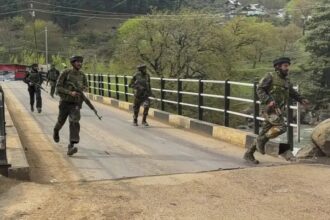Centre Files Caveat in Supreme Court as Waqf (Amendment) Act, 2025 Comes into Force
EC News Desk
New Delhi, April 9, 2025 – The Centre on Tuesday filed a caveat in the Supreme Court, seeking to ensure that no order is passed without hearing its side in response to multiple petitions challenging the constitutional validity of the Waqf (Amendment) Act, 2025. This move comes on the same day the controversial law officially came into force.
The Waqf (Amendment) Act, 2025, which was passed by Parliament last week amid heated debates, received presidential assent from President Droupadi Murmu on April 5. According to a notification issued by the Ministry of Minority Affairs, the provisions of the amended Act came into effect on April 8, 2025.
“In exercise of the powers conferred by sub-section (2) of section 1 of the Waqf (Amendment) Act, 2025 (14 of 2025), the Central Government hereby appoints the 8th day of April, 2025 as the date on which the provisions of the said Act shall come into force,” the notification stated.
The law has been strongly backed by the BJP-led NDA government, which claims that it aims to bring transparency and empower backward Muslims and women in the community. However, it has faced stiff resistance from the Opposition’s INDIA bloc and several Muslim organizations, who argue that the law is unconstitutional and infringes on the rights of Muslims.
More than ten petitions have been filed in the Supreme Court against the new legislation. These include pleas by politicians, the All India Muslim Personal Law Board, and Jamiat Ulama-i-Hind. Senior advocate Kapil Sibal, representing Jamiat Ulama-i-Hind, had urged the Supreme Court for an urgent hearing. On April 7, a bench headed by Chief Justice Sanjiv Khanna assured that the matter would be considered for listing.
Lawyers familiar with the case have indicated that the petitions may be taken up for hearing on April 15, although the date is yet to be reflected on the official website of the Supreme Court.
The Centre’s caveat is a procedural step to ensure that the Supreme Court does not pass any interim orders in these cases without first hearing from the government.














